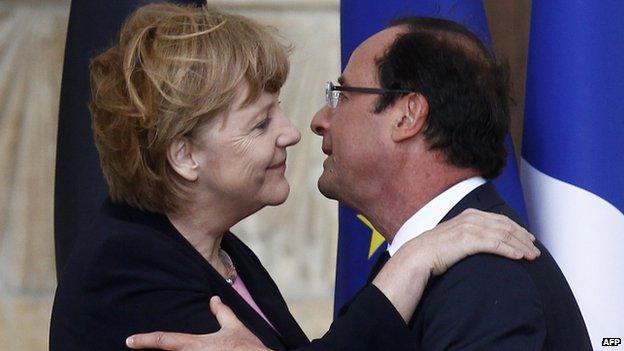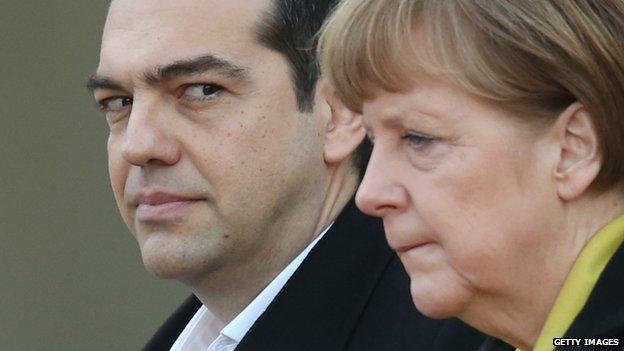Is the euro tarnished for good?
- Published

The euro, like true love, is forever.
The European Commission President Jean Claude Juncker said so:
"We should make sure that everyone understands that the economic and monetary union is irreversible."
Only now, 16 years into the marriage, that seems to have changed.
There is no legal provision in the EU's treaties for a country to give up the currency, at least not without giving up EU membership altogether. Nor is there any formal process for expulsion. Divorce was simply not ever supposed to be contemplated.
But the possibility of a Greek departure has now been explicitly countenanced by some of the currency's guardians.
Mr Juncker acknowledged earlier this month that they had "a Grexit scenario, prepared in detail".
The German Finance Minister Wolfgang Schaeuble went further, floating the idea of some time out from the eurozone for Greece. Some observers believe he would prefer Greece to walk out the door for good.
Rocky relationship
So what does it mean if the eurozone is not necessarily for keeps?
Does it become more like a fixed exchange rate system that can be revised when the economic calculus suggests a country would benefit from doing so? Not an enduring marriage but a relationship of convenience to be ditched when the going gets a bit rough?
That is what the European Exchange Rate Mechanism was like at times. The ERM was, a system designed to limit exchange rate fluctuations and was, for many - though not all - of its members, part of the preparation for full monetary union.
But it was a rocky relationship at times. In 1992 Britain and Italy were forced out as markets came to the view that their exchange rates were not sustainable. The following year, France was at the eye of the storm. That time the ERM members dealt with it by widening the bands that currencies were allowed to fluctuate within.
It was something they didn't want to do, but under pressure they did. It was an advantage of the ERM over a shared currency. There is flexibility that you can use if you really have to, flexibility to devalue the national currency and to shovel funds into your banking system without having to consult Frankfurt.
Fear of fracture
The danger is that if euro membership is also perceived to be porous like the ERM, then financial markets will change their view of the project. They will factor in the possibility that any member country might throw in the towel if the economic arithmetic suggests some advantage in doing so.

If the markets do reach that conclusion they might turn their speculative attention to the next country to get in similar difficulty. That would lead to higher borrowing costs for the government concerned, perhaps forcing them to give up the euro.
It is certainly possible. That was the fear that spread across the eurozone in 2012 as borrowing costs rose to painfully high levels for a number of governments - such as Spain and Italy.
Eurozone exit was avoided that time, but it was a very nervous period for officials who wanted to keep the project intact.
The concern now is that simply by admitting there's a possibility of fracture, we may have let a genie out of the bottle that it is hard to put back in.
Eurozone resilience
But there are reasons for supposing that the eurozone is built on foundations that are harder to shake than those of the exchange rate system. The costs of departing a currency union are a lot higher than giving up an exchange rate peg. There's the cost of introducing a new currency and the continued economic dislocation there would be during the transition period.
It is a bigger loss of credibility for the government concerned to replace a currency rather than alter an exchange rate peg.
You could also argue that such is the economic pain that Greece has taken, that it sends a signal that countries are willing to take truly exceptional steps to stay with the euro: a sign of its resilience.
And then there are the reforms that the eurozone as a whole has started, an attempt at tackling the fundamental design flaws that allowed the region's financial crisis to take hold in the first place.
'Fragile, vulnerable, imperfect'
Some steps toward banking union and to strengthen discipline over government finances have been taken. But it is all far from the level of integration that most economists regard as necessary to make the eurozone truly resilient to major economic shocks.
It is not complete, as the European Central Bank Mario Draghi has acknowledged.
"This union is imperfect, and being imperfect is fragile, vulnerable and doesn't deliver, doesn't deliver all the benefits that it could if it were to be completed. The future now should see decisive steps on further integration."
That process will take many years to complete. What we can say is that the further the eurozone goes down the path of integration in banking and government finances, the less it will look like a temporary and precarious exchange rate fix. It is however a path that's very difficult to travel politically, because it's likely to involve taxpayer's money, especially though not only from Germany.
The question remains: is the euro a marriage that will endure? It could certainly do with some tender loving care. There's just little of that in evidence just now.